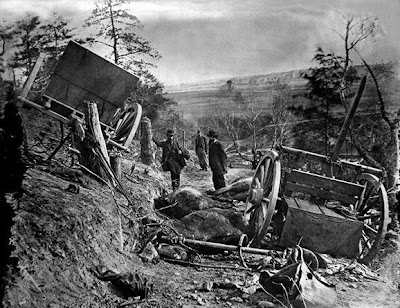WITH GOD on THEIR SIDE (kindle e-book) by John Frye
Just Does Not Live Up to the Promise of Its Title
Published by Endeavour Press Ltd. in 2013
Estimated length: 361 pages
I am a huge student of the Civil War. I own more than one hundred books (fiction and non-fiction) on the topic, a fact that my wife tolerates but only sort of understands. I think that there is something to be learned in well-researched historical fiction as well as the history texts because excellent historical fiction has the ability to place the reader in someone's shoes at the moment.
Taking on the topic of the Civil War in historical fiction can be a thankless undertaking - misstate the caliber of a weapon and the purists are all over you. Go on about slavery too much and the revisionists are after you. Fail to mention it at all and everyone else is after you. I thought Frye did just fine with all of those aspects in this book. I read nothing that did not seem correct as far as the details went.
With God on Their Side is about a Confederate General named William Page. Page is an expert in artillery and attended West Point before he became an Episcopal minister. He has a keen interest in the politics that led to the war but he has serious doubts about the role of a minister in the army. Eventually, he is pressured by his friends and neighbors into becoming their officer when they join up and he has great success at the the First Battle of Bull Run/Manassas.
 |
| A smashed Confederate artillery battery at the Battle of Fredericksburg. |
Page seems to be very decisive in that battle but, in reality, he has much more in common with Union General George McClellan - he is easily spooked, overly concerned about protecting his guns rather than using them and is a genius at training and organization and a disaster at the actual business of war.
Page seems to be loosely based on an actual Civil War figure - William N. Pendleton who was an Episcopal minister, was from the same town as the Page character (he married a woman with the last name Page), had a similar panic attack as Page did after the Sharpsburg/Antietam campaign and surrendered with Lee at Appomattox Court House. Both lost sons who were aides to Stonewall Jackson to battlefield injury.
Unlike the Page character, Pendleton seems to have been mostly an administrator, not a battlefield general at the end of the war.
Frye decided to give his main character a variety of roles in many battles rather than falling to the temptation of making him the centerpiece of every battle. For example, Frye decided to place Page in Fredericksburg during the Battle of Chancellorsville - you never hear much about the few troops that were left in Fredericksburg when Lee divided his smaller army to keep part of the much larger Union army out of the main fight in Chancellorsville and he had rear guard duty after Sharpsburg/Antietam campaign.
Slavery was a topic but he dealt with it mainly through his main character's family slaves (they were by far more interesting than the Pages, the family that owned them). The slave Wilson, who accompanies Page during the war as a manservant is interesting as he debates escaping to be a free man (he has two obvious chances) or staying with Page to whom he feels a certain amount of loyalty even if it is betrayed at one point. Wilson also knows that escaping to freedom means never seeing his wife, his family and everything he has known his whole life ever again, especially if he the Confederacy were to win its independence. His wife told him to take the chance when he got it but...
Back on the home front Union soldiers go around the front lines and raid into Confederate territory. The varied reactions of the slaves left back at home to the Union soldiers are interesting, much more interesting than the reaction of the white families (mostly horror) because to the slaves these soldiers represent a threat (possibility of rape for the female slaves), disruption, chaos, danger but also hope.
The book fails, I think, at the primary mission that is indicated by both the title and the book description. Was God on the side of the South? Was he on the side of the North? Does he take sides in war? If so, how does he show it? This is hinted at throughout the book but the best we get is the notion that the war just changed everything. Page's dithering is to be explained by extensive soul-searching, but to me it seemed like he was over-concerned with losing his guns (he goes on about the possibility of losing his guns in battle at least as much as he does about if God has forsaken the Confederacy.
A much better discussion in a piece of historical fiction about the role of God in the Civil War can be found in Howard Bahr's The Judas Field: A Novel of the Civil War.
I rate this e-book 3 stars out of 5 because it just does not live up to the promise of its title and there was simply too much watching General Page fret and worry and not doing much of anything. The wrong character was made the main character - if Wilson the slave had been the focus this might have been something great.
Note: I did discover that Frye has written another Civil War book that is currently free as a Kindle download on Amazon. I downloaded it and will give Mr. Frye's work another chance.
This book can be found on Amazon.com here: With God on Their Side by John Frye.











Comments
Post a Comment